#Ford Administration
Explore tagged Tumblr posts
Note
I’m curious about the friendship between Gerald Ford and Jimmy Carter (and presidential friendships in general,) I’d like to know what that looked like for them. Would they go and do things together or was it just a few phone calls a year?
Their relationship is really interesting because during the 1976 campaign and in the years right afterward, Ford and Carter genuinely did not like each other. It wasn't a normal, opponent vs. opponent rivalry, either. They straight-up disliked one another, and that was extremely unusual for Gerald Ford, who got along with practically everybody he met throughout his life, rarely had bad things to say about other people, and was almost physically incapable of being unkind to others, no matter what side of the political spectrum they belonged to.
What changed was when President Reagan sent all the living former Presidents -- Nixon, Ford, and Carter -- to Cairo in 1981 to attend Anwar Sadat's funeral following Sadat's assassination. The three former Presidents all flew together on one of the planes normally used as Air Force One, and there was some tension at the beginning, but the person who broke the ice, oddly enough, ended up being Richard Nixon. Ford then suggested that the former Presidents should drop all formalities and just refer to one another as Dick, Jerry, and Jimmy. As Ford remembered, "I guess we figured we were gonna be in a plane together forty hours, more or less, and in order to be pleasant, it was a good idea to just wipe the slate clean, which we did." Ford and Carter eventually started bonding, partly over the fact that Ronald Reagan was a major reason why each of them ultimately lost their respective bids for re-election.
At the time, Carter was having trouble building his Presidential Library, and he asked Ford for some advice since Ford had just recently opened his library. When Carter mentioned he was having some issues raising money for the library, Ford offered to come down and appear at fundraisers for him, and asked Carter to return the favor and visit the Ford Library for an event.
As Thomas M. DeFrank writes in his 2007 book, Write It When I'm Gone: Remarkable Off-the-Record Conversations With Gerald R. Ford (BOOK | KINDLE | AUDIO):
"Carter accepted, triggering a Jimmy-Jerry tag team match extending over several years. These back-scratching appearances didn't convert them into friends, but the relationship was notably friendlier. They began staying in regular contact, talking on the phone, and exchanging birthday greetings. Their contacts were sufficiently public that some of Ford's closest political allies grumbled that he was spending altogether too much time with Carter -- not unlike similar complaints from [George H.W.] Bush 41 partisans today that he hangs around Bill Clinton too much. Ford brushed off the complaints. Beyond their shared practical interests in Presidential Libraries, another unifying bond was at play. Both ex-Presidents had strong reasons not to like Ronald Reagan, which helped cement their ties even though neither one would ever admit it publicly. To one old Ford friend, the calculation was simple: 'Once you did something for his library or museum, you were a friend for life.'"
As they got older, Ford and Carter would sometimes make joint appearances at Presidential Libraries or universities, or events for important causes, and they even wrote a joint op-ed during the Monica Lewinsky scandal urging Congress to censure President Clinton instead of impeaching him. They felt it was a bad precedent (which it has clearly turned out to be) and would be bad for the country. Unlike Ford, Jimmy Carter wasn't very easy-going or personable, so there were times when their friendship would get a little frayed. Ford once told a friend, "Well, you know Jimmy. He can be a real pain in the ass, but we get along."
Eventually, they promised one another that they would deliver the eulogy if the other former President died first. President Ford died first, on December 26, 2006, and Carter attended every event during the several days of ceremonies, from Ford's lying in state at the U.S. Capitol, to the national funeral service at the Washington National Cathedral, and traveled with Ford's family and the former President's remains to Ford's hometown of Grand Rapids, Michigan. At the church service in Grand Rapids, Carter delivered his eulogy, and also attended the private interment service when Ford was buried as at his Presidential Library. In his eulogy, Carter repeated the gracious first words he had said when delivering his Inaugural Address on the day he took over the White House from Ford in 1977, "For myself and for my nation, I want to thank my predecessor for all he has done to heal our land." It was a remarkable relationship between two former Presidents who, again, genuinely disliked one another for quite some time.
#History#Presidents#Presidential History#Gerald R. Ford#President Ford#Ford Administration#Gerald Ford#Jimmy Carter#President Carter#Carter Administration#Presidential Rivals#Presidential Friendships#Presidential Relationships#Presidential Frenemies#Funeral of Gerald Ford#Death of Gerald Ford#Thomas M. DeFrank#Write It When I'm Gone#Write It When I'm Gone: Remarkable Off-the-Record Conversations with Gerald R. Ford#1976 Election#Inauguration of Jimmy Carter#Election of 1976#Presidency
108 notes
·
View notes
Text
With this stupid group chat thing in the news, here's a throwback to when Natalia and I watched the 2024 election live and recorded our reactions.
Topics of conversation include Sam and Natalia’s £100 election bet, Melania Trump, the state of democracy, nice Americans, Hillary Clinton, cultural pessimism, Keir Starmer the Red Tory, the Electoral College, Joe Biden’s historical legacy, AI, the new countercultural movement, and the future of the United States.
#donald trump#trump administration#trump#fuck trump#president trump#jd vance#white house#doge#fuck donald trump#fuck doge#fuck doug ford#2024#kamala harris#democratic party#doctor who#spotify#dr who#podcast#david tennant#the doctor#uk#new who#my girlfriend and doctor who#nuwho#democracy#project 2025#democrats#america#usa#ai
6 notes
·
View notes
Text
Liberals, as usual in their shit, praise those complicit in genocide as if they were messiahs



And the anti-immigration people… Classic


By the way, I love classism, it's always so healthy for white privileged Americans with liberal views to use poverty as an old man <3

And then they will tell us that they care about Palestine…
#democratic party#free palastine#free palestine#harris#kamala harris#vote harris#harrison ford#harris 2024#kamala#fuck kamala harris#joe biden#biden#israel is a terrorist state#vote biden#president biden#biden administration#election#2024 election#us election#2024 presidential election#vote blue#liberal#liberalism#liberals#fuck liberals#fuck libertarians#obama#president obama#barack obama#fuck obama
16 notes
·
View notes
Text
Thank you The American Dream (1945-1980) AQA A-Level History for reminding us of Tom Lehrer.
Anyway now listen to his stuff it's very funny :3
#tom lehrer#was not expecting to be reminded of Poisoning Pidgeons in the Park when reading about Kissinger in a fuckin textbook lmao#its even funnier if you realise we're nowhere near the Nixon/Ford Administration in our lessons#i mean bitch we're cleaning up Kennedy('s corpse) ofc we're nowhere near Nixon
4 notes
·
View notes
Text
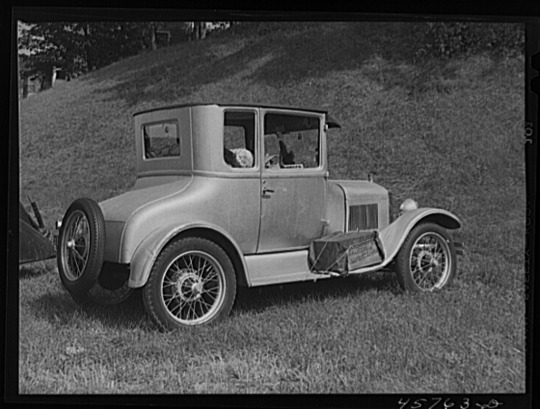

At the Tunbridge, Vermont, "World's Fair," September 16-18, 1941. Jack Delano photos for the Farm Security Administration.
#Tunbridge World's Fair#Tunbridge Vermont#Vermont#New England#Great Depression#New Deal#Jack Delano#farm security administration#1941#1940s#Ford Model T#Dodge Brothers
13 notes
·
View notes
Text


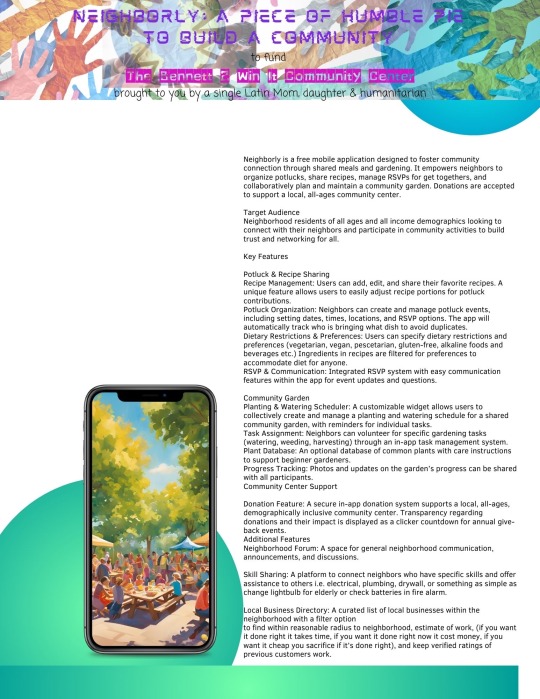





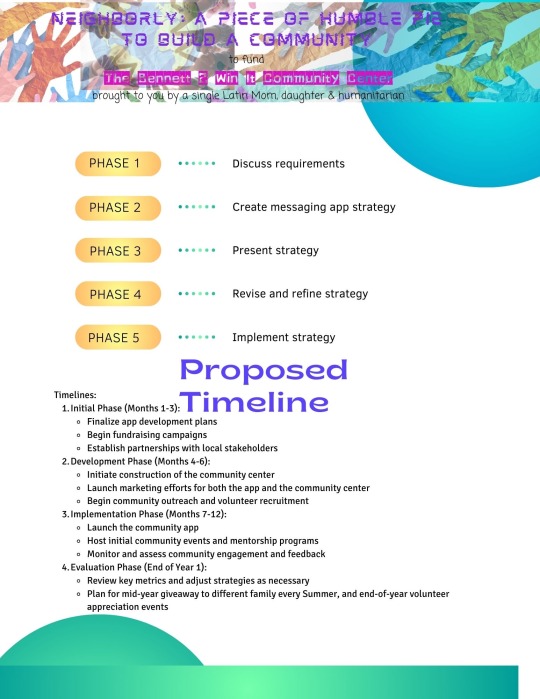

Working on a huge community impact project, free to the public idea for an app, to accomplish community. Focusing people around being more communal with recipe sharing, potluck organizing, farmer’s market and community gardening schedule, also allowing local businesses, that need the business advertising, to help fund a community center.
#community project#donations#entrepreneur#recipes#potluck dinner#gardening#investment#bitcoin#donald trump#biden administration#obama#michelle obama#chevy#ford mustang#google#Canva#chrome#safari#HUMANITY
2 notes
·
View notes
Text
Vehicle Recall: Ford Maverick Pickup Trucks:
#25V350000#air bag#Air Bag Indicator Light#Air Bag Indicator Light Retaining Clips#apparent contravention of US FMVSS 208#assistive device failure hazard#component detachment hazard#crash hazard#Dashboard#Electronics#Ford Maverick Pickup Trucks#Ford Motor Company#injury hazard#Laceration hazard#NHTSA#NHTSA Campaign Number: 25V350000#Recalls Direct RIN: 19851-2025#US National Highway Traffic Safety Administration ("NHTSA")
0 notes
Text
#elon musk#us news#us presidents#ronald reagan#america#america first#american politics#george h w bush jr#lyndon b. johnson#presidents#inauguration#inauguración#gerald ford#the onion#government corruption#geopolitics#lyndon baines johnson#political#presidential election#dead presidents#rfk jr#philosophy#phil connors#social security#social media#bernie sanders#feel the bern#twitter#public news#trump administration
0 notes
Note
Hello!
Maybe to get our minds off this mess, do you have any fun pictures or lesser-known stories about the White House Pets and First Dogs (or Second Dogs. Champ FTW)?
Thank you!
I'm a big fan of President Ford's golden retriever, Liberty.

Here's an excerpt from a page about Liberty on the White House Historical Association's website, which tells you a lot about her and President Ford:
"Liberty quickly settled into life at the White House. She was often photographed outside, enjoying the South Lawn on sunny days. Liberty also enjoyed swimming in the pool at Camp David. At times, President Ford, allegedly used Liberty as a diversionary tactic in the Oval Office. When he wanted a meeting to end, he would signal to Liberty, who wagged her tail enthusiastically at the guest. This created a conversational break so the President could stand up, indicating the meeting had come to its conclusion. Liberty was part of the family at the White House, with President Ford frequently assisting with her care. At Ford's funeral in 2007, former White House Press Secretary David Nessen recalled that one day, Liberty 'made a mess' on the carpet in the Oval Office. A Navy steward started to clean it up, but President Ford stopped him, remarking that, 'no man should have to clean up after another man's dog.'"
That leads to a classic story about President Ford and a very pregnant Liberty getting locked out of the White House Residence in the middle of the night when the President took her outside to go to the bathroom. The Secret Service had to let him back inside.
#Presidents#History#Presidential History#White House#White House Pets#White House History#First Families#First Pets#First Dogs#Liberty#Gerald Ford#President Ford#Gerald R. Ford#Ford Family#Ford Administration#White House Historical Association
36 notes
·
View notes
Text
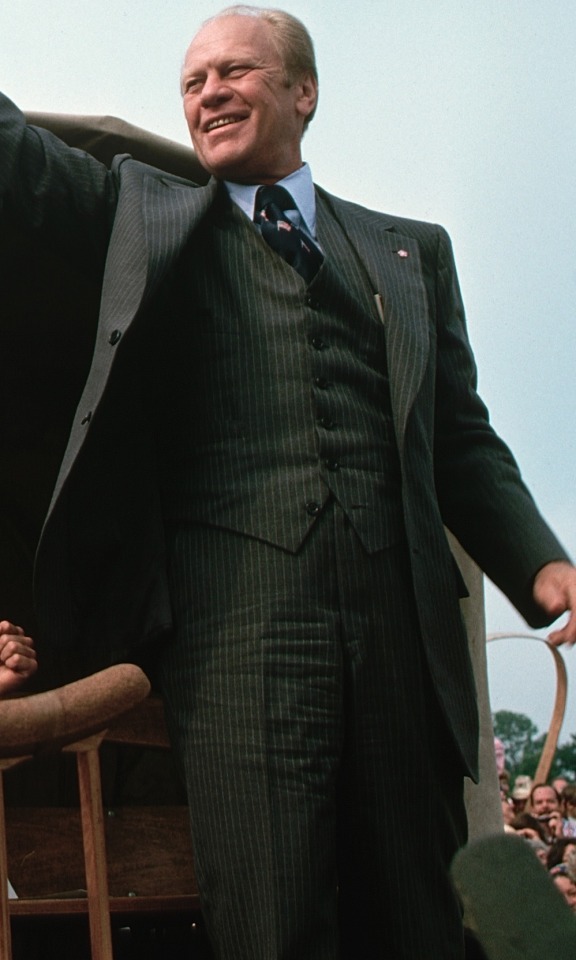
Gerald Ford
#suitdaddy#suiteddaddy#suit and tie#suited daddy#men in suits#suitfetish#three piece suit#waistcoat#suited men#suited grandpa#suitedman#suit daddy#suited man#buisness suit#suitedmen#americans#republicans#potus#nixon administration#Gerald Ford
14 notes
·
View notes
Text
Trump’s Tariffs on Canada: Because Nothing Says “Diplomacy” Like Stupid Economic Self-Sabotage
UPDATE: And just as fate would have it, these Liberals have flip-flopped quicker than I could even finish this article. Keep reading to discover how it all began; every twist and turn will leave you stunned as things spiral wildly, revealing just how Trudeau bent over at the hip as we all anticipated. How the Tariffs on Canada started In a move that shocked absolutely no one with a functioning…
#America#Canada#canada news#canada trump#Canadian Economy#canadian news#canadian relations#canadian tariffs#ford#global tariffs#Justin Trudeau#liberal leadership#liberal party#political flip flop#political flop#tariff disputes#tariff negotiations#Tariff war#Tariffs#trade agreements#trade conflicts#Trade War#trudeau news#Trump#trump administration#United States#us canada politics#us canada relations#us tariffs#us trade policy
0 notes
Text
Q&A: Examining American attitudes on global climate policies
New Post has been published on https://thedigitalinsider.com/qa-examining-american-attitudes-on-global-climate-policies/
Q&A: Examining American attitudes on global climate policies


Does the United States have a “moral responsibility” for providing aid to poor nations — which have a significantly smaller carbon footprint and face catastrophic climate events at a much higher rate than wealthy countries?
A study published Dec. 11 in Climatic Change explores U.S. public opinion on global climate policies considering our nation’s historic role as a leading contributor of carbon emissions. The randomized, experimental survey specifically investigates American attitudes toward such a moral responsibility.
The work was led by MIT Professor Evan Lieberman, the Total Chair on Contemporary African Politics and director of the MIT Center for International Studies, and Volha Charnysh, the Ford Career Development Associate Professor of Political Science, and was co-authored with MIT political science PhD student Jared Kalow and University of Pennsylvania postdoc Erin Walk PhD ’24. Here, Lieberman describes the team’s research and insights, and offers recommendations that could result in more effective climate advocacy.
Q: What are the key findings — and any surprises — of your recent work on climate attitudes among the U.S. population?
A: A big question at the COP29 Climate talks in Baku, Azerbaijan was: Who will pay the trillions of dollars needed to help lower-income countries adapt to climate change? During past meetings, global leaders have come to an increasing consensus that the wealthiest countries should pay, but there has been little follow-through on commitments. In countries like the United States, popular opinion about such policies can weigh heavily on politicians’ minds, as citizens focus on their own challenges at home.
Prime Minister Gaston Browne of Antigua and Barbuda is one of many who views such transfers as a matter of moral responsibility, explaining that many rich countries see climate finance as “a random act of charity … not recognizing that they have a moral obligation to provide funding, especially the historical emitters and even those who currently have large emissions.”
In our study, we set out to measure American attitudes towards climate-related foreign aid, and explicitly to test the impact of this particular moral responsibility narrative. We did this on an experimental basis, so subjects were randomly assigned to receive different messages.
One message emphasized what we call a “climate justice” frame, and it argued that Americans should contribute to helping poor countries because of the United States’ disproportionate role in the emissions of greenhouse gasses that have led to global warming. That message had a positive impact on the extent to which citizens supported the use of foreign aid for climate adaptation in poor countries. However, when we looked at who was actually moved by the message, we found that the effect was larger and statistically significant only among Democrats, but not among Republicans.
We were surprised that a message emphasizing solidarity, the idea that “we are all in this together,” had no overall effect on citizen attitudes, Democrats or Republicans.
Q: What are your recommendations toward addressing the attitudes on global climate policies within the U.S.?
A: First, given limited budgets and attention for communications campaigns, our research certainly suggests that emphasizing a bit of blaming and shaming is more powerful than more diffuse messages of shared responsibility.
But our research also emphasized how critically important it is to find new ways to communicate with Republicans about climate change and about foreign aid. Republicans were overwhelmingly less supportive of climate aid and yet even from that low baseline, a message that moved Democrats had a much more mixed reception among Republicans. Researchers and those working on the front lines of climate communications need to do more to better understand Republican perspectives. Younger Republicans, for example, might be more movable on key climate policies.
Q: With an incoming Trump administration, what are some of the specific hurdles and/or opportunities we face in garnering U.S. public support for international climate negotiations?
A: Not only did Trump demonstrate his disdain for international action on climate change by withdrawing from the Paris agreement during his first term in office, but he has indicated his intention to double down on such strategies in his second term. And the idea that he would support assistance for the world’s poorest countries harmed by climate change? This seems unlikely. Because we find Republican public opinion so firmly in line with these perspectives, frankly, it is hard to be optimistic.
Those Americans concerned with the effects of climate change may need to look to state-level, non-government, corporate, and more global organizations to support climate justice efforts.
Q: Are there any other takeaways you’d like to share?
A: Those working in the climate change area may need to rethink how we talk and message about the challenges the world faces. Right now, almost anything that sounds like “climate change” is likely to be rejected by Republican leaders and large segments of American society. Our approach of experimenting with different types of messages is a relatively low-cost strategy for identifying more promising strategies, targeted at Americans and at citizens in other wealthy countries.
But our study, in line with other work, also demonstrates that partisanship — identifying as a Republican or Democrat — is by far the strongest predictor of attitudes toward climate aid. While climate justice messaging can move attitudes slightly, the effects are still modest relative to the contributions of party identification itself. Just as Republican party elites were once persuaded to take leadership in the global fight against HIV and AIDS, a similar challenge lies ahead for climate aid.
#Administration#agreement#American#approach#attention#budgets#carbon#carbon emissions#carbon footprint#career#career development#Center for International Studies#challenge#change#Charity#climate#climate change#communications#democrats#Developing countries#development#double#effects#Emissions#Events#experimental#Fight#finance#focus#Ford
0 notes
Text
BIDEN WANTED TO KILL CANADIANS
#free palestine#israel is a terrorist state#free free palestine#palestine#wtf#like wtf#wtf is going on#bruh#joe biden#biden#vote biden#president biden#biden administration#election#2024 election#us election#2024 presidential election#vote blue#fuck joe biden#canada#harris#kamala harris#vote harris#harris 2024#harrison ford#kamala#president#debate#presidential#fuck kamala harris
3 notes
·
View notes
Text
Vehicle Recall: Ford Lincoln Aviator SUVs:
#25V407000#C-Pillar Trim#component detachment hazard#crash hazard#Engine failure#Ford Lincoln#Ford Motor Company#injury hazard#Laceration hazard#Lincoln#Lincoln Aviator#NHTSA#NHTSA Campaign Number: 25V407000#njury hazard#Rear Door Window Bars#Recalls Direct RIN: 19850-2025#US National Highway Traffic Safety Administration ("NHTSA")
0 notes
Text
🇺🇸 American Candidate: Joe Biden 🫏
👴🏻 As the oldest person ever elected president, Joe Biden faced immense challenges. But would his 🕰��� decades of experience be enough to guide the 🇺🇸 nation through 🌊 turbulent times?
#joe biden#biden#biden administration#bidenomics#president biden#vote biden#vote blue#vote democrat#ronald reagan#reaganomics#eisenhower#henry ford#ford#james buchanan barnes#john adams#1776#thomas jefferson#james madison#james monroe#chaos#fluctuation#agitation#swirling#swirl#unpredictable
0 notes
Text
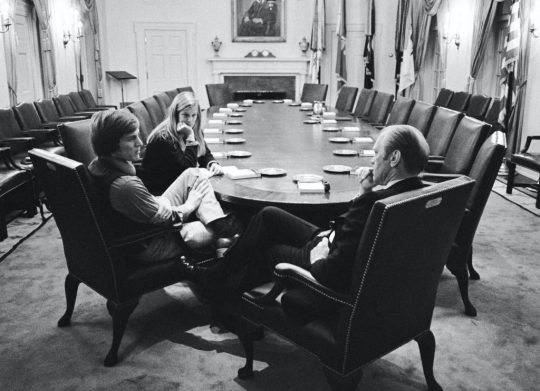
10:52 AM: The President goes into the Cabinet Room to receive a delegation of Soviet officials, led by (it should not be incredible that stereotypes sometimes actually do show up) a simulacrum of a bear, a great hugger of a Russian man, State Minister of the Food Industry Voldemar Lein. With him are the ministers of food production, all looking well fed, for the Ukraine, Belorussia, Estonia, Armenia, Kazakhstan, Uzbekistan and the Russian Republic. These men have just completed a delicious tour. They have been invited by Donald M. Kendall, chairman of PepsiCo -- which has established a bottling plant in the Soviet Union and distributes Soviet vodka here -- to see how food is processed in the United States, and from sea to shining sea they have visited plants of Hershey chocolate, Heinz soups and canned foods, Sara Lee frozen cakes and pastries, Kraftco cheese and margarine, Coors beer, Sun Maid raisins, Roma wine, Valley Foundry (winery equipment), Bird's Eye foods, Maxwell House coffee, Frito-Lay potato products, Tropicana orange juice, Pepsi-Cola bottling and Philip Morris cigarettes. While waiting for the President, the various national food ministers have been taking turns popping in and out of the chair with the little brass plate on the back which says THE PRESIDENT while a pal across the table takes snapshots of them in the highest seat of power. On the President's entrance everyone cools it and takes a Cabinet member's chair. Of all the establishments the Russians visited, the one minister Lein talks about with the most ursine joy is Disney World. FORD: Did you go in the Haunted House? LEIN: (rolling his eyes in terror): Da! Da! Da!
-- The President: A Minute-by-Minute Account of a Week in the Life of Gerald Ford by John Hersey (BOOK | KINDLE), a wonderful little book from 1975, by Hersey, a legendary journalist who was given unprecedented access to the Ford White House for a fly-on-the-wall report of a week following President Ford.
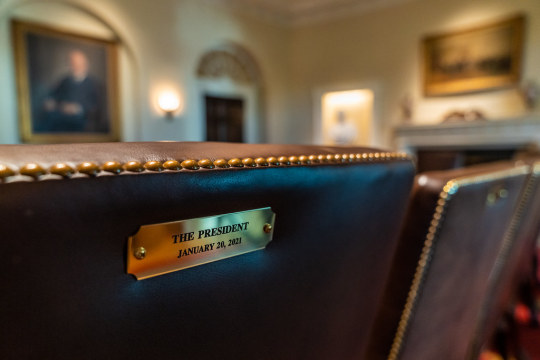
The President's chair in the Cabinet Room of the White House is always affixed with a brass plate labeled "THE PRESIDENT" along with the date of the President's inauguration. At the end of each President's term, they are given the opportunity to take the chair with them, but since it is government property, they are required to personally pay for it if they do so.
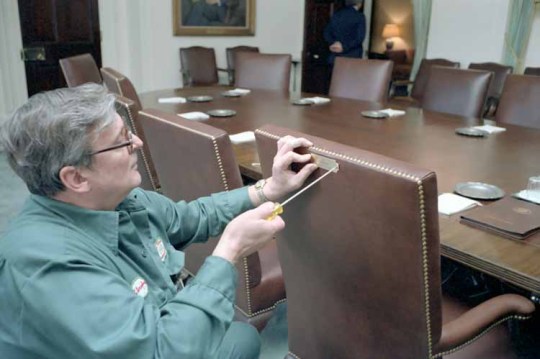
#History#Presidents#Presidential History#Presidency#Gerald Ford#President Ford#Ford Administration#Gerald R. Ford#Cabinet Room#White House#White House History#John Hersey#The President#The President: A Minute-by-Minute Account of a Week in the Life of Gerald Ford
25 notes
·
View notes